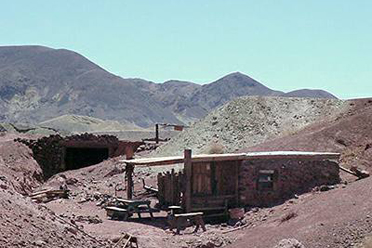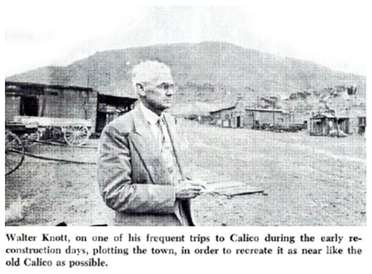San Bernardino County:
Calico
News of the silver discovery made by Waterman and Porter at George Lee's old mine spread quickly and soon hundreds of new locations were made. On April 6, 1881, S. C. Wardan, Hues Thomas and John C. King located claims on Calico Mountain. They named their discovery the Silver King Mine. 263Below the Silver King Mine the town of Calico grew slowly. In the spring of 1882 there were only 100 people living there. In July, 1882, the Silver King Mine was sold to San Francisco interests for $300,000. This, along with the consolidation of many individual claims led to more efficient mining. There were no less than 46 mines of note near Calico with the most important being the Waterloo, Bismarck, Oriental, Garfield and Burning Moscow. 264
At first the ore from the Silver King Mine was hauled to Oro Grande, 40 miles away, but in 1882 a ten-stamp mill was erected beside the Mojave River at Daggett. There were numerous other mills in the area. Hawley's mill at Camp Cady ran on ore from the Cuba Mine, located west of Calico, and from the mines of the Silver Odessa Mining Company. The ore from the Garfield mines were worked between 1883 and 1885 at Barber's mill, northwest of the mouth of Mule Canyon. The Odessa, Oriental and Occidental mines' ore was processed at the mill owned by the Silver King Mining Company of London, England, and located between the mouth of Wall Street and Odessa Canyons. 265
In 1887 the Oro Grande Company began building a mill next to their mill at Daggett (which had been enlarged in 1884 to fifteen stamps). Just before completion, the mill burned to the ground, but work was resumed at once. To reduce transportation costs, as narrow gauge railroad was constructed in 1888 to bring ore from the Waterloo and Silver King mines to the mill. The falling price of silver shut down these mines in 1892. By 1896, the Silver King Mining Company also shut down. The mines of Calico produced between $13,000,000 and $20,000,000 worth of silver. 266
Around 1917 cyanide was used to recover silver from the Silver King mine dumps, and during the early 1930s there was a small operation, the Zenda Gold Mining Company, which mined silver. Gold was mined from the Total Wreck (Burcham) Mine from the 1930s until 1941. There is a strong possibility that the enormous quantities of low grade silver ore present at Calico will one day be mined. 267
As a town, Calico, with its one street perched on an inclined mesa, had a turbulent existence. It burned to the ground in the fall of 1883, and was rebuilt. After it was vacated in the 1930s, the remains of Calico sat derelict until 1950, when Walter Knott, owner of Knotts Berry Farm in Buena Park, converted the ghost town into a tourist attraction. 268
Three miles east of Calico, the town of Borate was formed near borax deposits mine since 1884 by "Borax" Smith. A railroad named the Borate & Daggett was laid into Mule Canyon in 1898. The borax mines were abandoned in 1907 after yielding nine million dollars worth of borax minerals. 269
Calico Ghost Town
Calico Mining History
Discovery of the Calico Mines
Waterman, Calico, Bismarck

Calico
